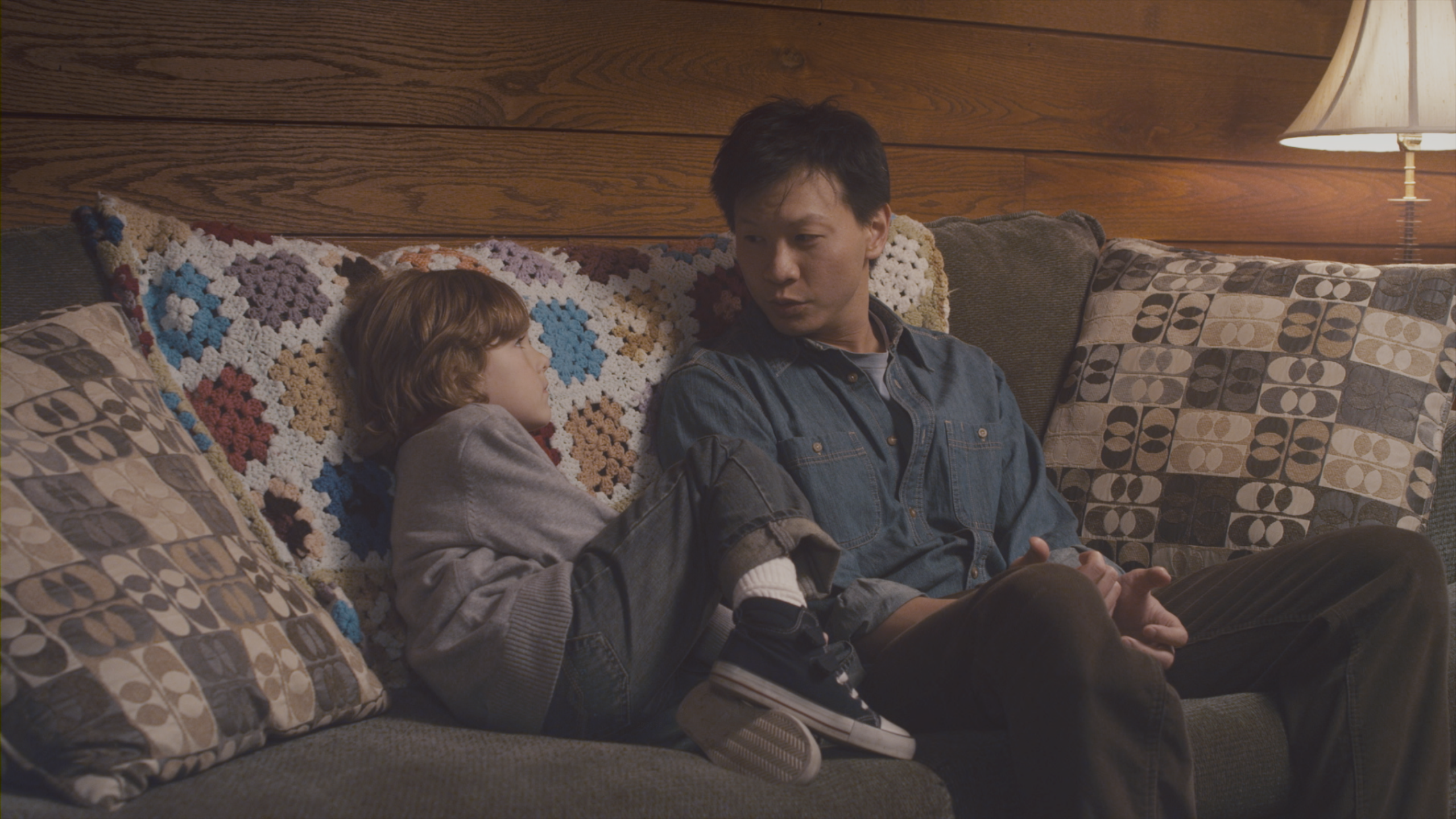Slowly and delicately drawing attention and care from the audiences, “In the Family” comes to us as a simple story about one family matter. Never disrupting its slow but steady pace throughout its long running time (169 minutes), it gives us a real slice of life through its intimate human drama filled with realistic characters, and there are many scenes deeply resonating with empathy and understanding behind its composed but caring attitude.
In the beginning, we observe the daily life of a family residing in Martin, Tennessee. Joey Williams (Patrick Wang), a Chinese-American man who works as a contractor, has been living with Cody Hines (Trevor St. John) for several years, and he and Cody have been good dads to Chip (Sebastian Brodziak), Cody’s young son from his previous marriage (his wife died in childbirth not long before he fell in love with Joey). Yes, they are not exactly a conventional family, but watching them begin another usual day in the kitchen, we can see through their warm interactions that they are happy to be together.

Sadly, their happy time is suddenly terminated due to an unfortunate incident. Cody is sent to the hospital after some unspecified accident, and Joey is notified of Cody’s death not long after he hurriedly comes to the hospital with Chip. Feeling devastated by his life partner’s death after the funeral, Joey slowly begins to move on with the remains of their life. He sorts out the matters to be taken care of after the funeral. He takes Chip to school as Cody usually did. He continues to work with his co-workers as usual. He also does an extra bookbinding job when he sees his client in the need of it.
So it seems life goes on as before, but then he comes across a serious family matter while handling Cody’s financial matters. Cody somehow forgot to modify his will, which was written before he began to live with Joey, and the will appoints his sister Eileen (Kelly McAndrew) as not only the sole recipient of Cody’s estate but also Chip’s legal guardian. Although Eileen has been on good terms with Joey like Cody’s other family members, she insists that she take care of Chip, and Joey is naturally flabbergasted by this. After a short argument between them, Chip is soon taken away from Joey, and he comes to see more about how legally disadvantageous his position is in this family crisis. As a lawyer tells him, he has no child custody case because Cody’s will cannot be easily contested—and the Tennessee state law does not recognize him as Cody’s family member, let alone as his spouse.

Rather than underlining the issues inside the story, the movie simply presents its story and characters, and gradually grows on us at an emotional level while seldom raising its voice. The rhythm of the mundane daily life on the screen is established well thanks to its concise low-key approach, and the camera attentively observes the characters without feeling obtrusive; it engages our attention through thoughtful scene compositions and interesting camera angles, and we come to be curious about what is happening on the screen. Through their natural performances, the actors in the film feel like people we may encounter in real life, and you may be surprised to know that the movie was actually shot in New York State instead of Tennessee.
The director/producer/writer Patrick Wang, who also played the lead character in his film, subtly presents his character’s social status as an outsider while never directly pointing it out. Cody’s family members were nice to Joey when Cody came with him to the family Thanksgiving dinner, but, probably because of his race, they misguidedly assumed that Joey did not know about Thanksgiving Day. When Cody’s family members are allowed to see unconscious Cody at the hospital, a nurse curtly reminds Joey that he is not allowed to see Cody, and everyone in the room clearly knows why. Eileen and other family members might be sympathetic to Joey at that time, but it can be said that they also show their own prejudice as hiding behind legal procedures to separate Chip from Joey.
The camera frequently shows the back of Joey’s head in many scenes. Sometimes we sense the invisible gap between him and others, and sometimes we wonder about what is going on inside him as he observes others around him. In one long-take scene, the camera stays behind Joey as he is talking with another character, and its depiction of the emotional tumult surrounding them is convincing, although we do not see Joey’s face at all. When Joey hears the news of Cody’s death at the hospital, the camera looks at him from behind with considerable distance, but the emotional impact beneath the surface is palpable, even though we do not hear much from him.

As the humble center of the movie, Patrick Wang gives an unaffected performance which will linger in your mind through its embodiment of benign humanity. You may think Joey is too good to be real, but Wang convincingly presents his character as a real person with flesh and blood, and the other actors in the film are as believable as Wang in their scenes with him. Trevor St. John, who mostly appears in flashback scenes after his character’s death, has a good scene where his character and Joey unexpectedly discover the mutual feeling between them. Regardless of whether they were previously aware of their sexuality, things just click between them, and, like any other couples, that’s enough for them—and they don’t need any explanation for that (and neither do we, by the way).
Along with young actor Sebastian Brodziak, Wang and St. John make their household scenes genuinely warm and spontaneously lively. Cody, who works as a school teacher, has encouraged and stimulated his son’s curiosity (Chip is fascinated with dragon stories like most of us were fascinated with dinosaurs during our childhood), and Joey gladly helps that learning process with the wooden boxes he crafts. Even when he is prevented from contacting Chip, Joey finds a way to reach out to his son, and that leads to a restrained but undeniably poignant scene in which the camera quietly focuses on what is happening behind the door with a certain supporting character. The scene is almost wordless in its restraint except for Joey’s recorded voice telling Chip a story, but the emotional bond between them resonates through his voice brimming with fatherly care.
When the circumstance still looks hopeless to him despite the support and help from others, Joey gets unexpected help from his client Paul Hawks, a retired lawyer who is impressed by Joey’s good jobs on his library and books. Hawks (Brian Murray) volunteers to handle Joey’s case simply because he sees Joey as a good man in need of help, and this wise, sensible old man gives good practical advice to Joey, who attentively listens to Hawks during their long but meaningful conversation and immediately follows his advice as a good client.

The drama eventually culminates in a long but memorable scene that unfolds within a conference room where Joey gives legal depositions to both sides. The lawyer representing Eileen and her husband throws a couple of pretty nasty questions to him at the start, but Joey calmly and reasonably answers to them, and then he talks about several things in his life: his unhappy childhood, his foster parents, his short but happy life with Cody, and, above all, Chip. Listening to his sincere and honest words, we realize more fully how much the family means to him—and how much he is willing to give up anything for what’s most important to him.
As Joey was talking about his foster parents, I was reminded of a small human moment in “Short Term 12,” another small independent film you should not miss (and which will be playing at this year’s Ebertfest). In that scene, one of its main characters gives a short but heartfelt speech to his foster parents as an act of deep appreciation, and we see this old couple being surrounded by many of their former foster children, who are still grateful for the love and care they received during their early years.
We only hear about Joey’s foster parents, but I can say that they were people as good as that loving old couple in “Short Term 12”. They taught him many things, including parental love and several crafts useful for his living, and, Joey, who changed his name to remember them after their death, surely learned a lot to be a good person like them—and we never doubt his ability to raise Chip by himself.
The movie is Patrick Wang’s debut film, and he shows remarkable confidence in his direction; he trusts us to follow his story for more than 2.5 hours, and he keeps us involved and interested while steadily building emotional momentum behind his scenes. I must confess that I was a bit concerned before playing the Blu-ray disc, but it turned out that I did not need any extra patience during my viewing; I was absorbed by its assured storytelling, and I was frequently touched a lot by its small but moving gestures of human decency. It is indeed a fiction, but it feels real through its universal family drama, and it gently tells us through its good, decent hero that we can do better than expected to others in our life, as reflected in its powerful final shot.











